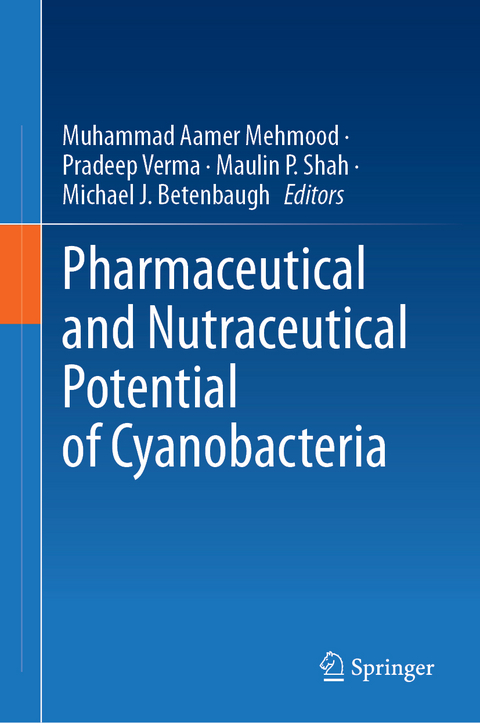
Pharmaceutical and Nutraceutical Potential of Cyanobacteria
Springer International Publishing (Verlag)
978-3-031-45522-3 (ISBN)
This book "Pharmaceutical and Nutraceutical Potential of Cyanobacteria" is a collection of 14 book chapters that have covered almost all aspects related to the opportunities, challenges, and potential applications whileemploying cyanobacteria as feedstock for various industrial and environmental applications with a special focus on pharmaceutical and nutraceutical applications. Some sections have also covered the enhanced biosynthesis, extraction, storage, and marketing of the cyanobacterial bioactive compounds (phycobilins, carotenoids, fatty acids, amino acids), and applications of cyanobacteria as food/feed of the future. We believe that this book will provide substantial learning opportunities to the readers including graduate students, academicians, phycologists, policymakers, environmental entrepreneurs, and industrialists.
This book could be included in SDG 12 publications.
lt;p>Prof. Dr. Muhammad Aamer Mehmood earned his Ph.D. from Quaid-i-Azam University, Islamabad, Pakistan in 2010. He has teaching & research experience spanning more than 12 years as a regular faculty member at Government College University Faisalabad (GCUF), Pakistan. Besides, he has research experience at the Third Institute of Oceanography (Xiamen, China), Sichuan University of Science & Engineering (Zigong, China), & Shanghai Jiaotong University (Shanghai, China).
Currently, he is working as a Professor and Lead-PI of the BioEcoTech Research Cluster at the Department of Bioinformatics and Biotechnology. He has been working on process optimization for the sustainable utilization of bio-resources with a special focus on microalgae and cyanobacteria, wastewater recycling, and biomass-to-bioenergy conversion through pyrolysis and bioprocessing since 2010. His research projects involve bioprospecting and characterization of microalgae/cyanobacteria in a multiproduct biorefinery paradigm to produce bioproducts (biofertilizers, industrial enzymes, biopolymers) while keeping the Energy-Water Environment nexus sustainable.
He has received research funding from the Higher Education Commission, in Pakistan, the International Foundation for Science in Sweden, The World Academy of Sciences in Italy, and the National Natural Science Foundation of China. He has authored/co-authored hundred (100) research & review articles (with ~563 Impact Factor) in peer-reviewed journals and eleven (11) book chapters. For his contributions to the field, He was awarded the Research Productivity Award (one of the most prestigious academic awards in Pakistan) for the years 2011, 2012, and 2014 by Pakistan Council for Science & Technology, and Young Leaders Award 2017 by Positive Pakistan. Moreover, in 2019, he was honored with the highest province-level academic title "The Distinguished Expert" by the Sichuan government, China.
He serves as Editor/Guest Editor at several reputed journals including Protein & Peptide Letters, Biomass Conversion and Biorefinery, PLOS ONE, PeerJ, BMC Biotechnology, Environmental and Toxicology Management, Asian Journal of Agriculture and Biology. He is an Executive Board Member of the Asian Federation of Biotechnology and Secretary-General of the Asian Federation of Biotechnology (Pakistan Chapter).
Prof. Dr. Pradeep Verma completed his Ph.D. from Sardar Patel University, Gujarat, India, in 2002. In the same year, he was selected as UNESCO fellow and joined Czech Academy of Sciences, Prague, Czech Republic. He later moved to Charles University, Prague, to work as a Post-Doctoral Fellow. In 2004, he joined as a visiting scientist at UFZ Centre for Environmental Research, Halle, Germany. He was awarded a DFG fellowship which provided him another opportunity to work as a Post- Doctoral Fellow at Gottingen University, Germany. He moved to India in 2007 where he joined Reliance Life Sciences, Mumbai, and worked extensively on biobutanol production which attributed a few patents to his name. Later he was awarded with JSPS Post-Doctoral Fellowship Programme and joined Laboratory of Biomass Conversion, Research Institute of Sustainable Humanosphere (RISH), Kyoto University, Japan. He is also a recipient of various prestigious awards such as Ron-Cockcroft award by Swedish society, UNESCO Fellow ASCR Prague. Prof. Verma began his independent academic career in 2009 as a Reader and Founder Head at the Department of Microbiology at Assam University. In 2011, he moved to the Department of Biotechnology at Guru Ghasidas Vishwavidyalaya (a Central University), Bilaspur, and served as an Associate professor till 2013. He is currently working as Professor (former Head and Dean, School of Life Sciences) at Depart
Chapter 1. Cyanobacterial Cell Factories; Insight into Their Pharmaceutical and Nutraceutical Properties.- Chapter 2. Cyanobacterial Pigments: Pharmaceutical and Nutraceutical Applications.- Chapter 3. Spirulina as a Food of the Future.- Chapter 4. Potential of Cyanobacterial Biomass as an Animal Feed.- Chapter 5. Cost-Effective Cultivation of Cyanobacteria for Biotechnological Applications.- Chapter 6. Storage, Processing, and Stability of Phycobilins.- Chapter 7. Non-Conventional and Novel Strategies to Produce Spirulina Biomass.- Chapter 8. Cyanobacteria-based Green Synthesis of Nanoparticles for Industrial Applications.- Chapter 9. Cyanobacterial Bioactive Compounds; Synthesis, Extraction, and Applications.- Chapter 10. Threats, Challenges, and Issues of Large-Scale Cyanobacterial Cultivation.- Chapter 11. Cyanobacterial Exopolysaccharides; Extraction, Processing and Applications.- Chapter 12. Innovations in the Cyanobacteria-Based Biorefineries for Biopharmaceutical Industries.- Chapter 13. Cyanobacteria Biotechnology: Challenges and Prospects.- Chapter 14. Global Research Trends in Cyanobacteria; Bioproducts and Culture Collection.
| Erscheinungsdatum | 25.03.2024 |
|---|---|
| Zusatzinfo | XIV, 356 p. 47 illus., 42 illus. in color. |
| Verlagsort | Cham |
| Sprache | englisch |
| Maße | 155 x 235 mm |
| Themenwelt | Medizin / Pharmazie ► Gesundheitsfachberufe ► Diätassistenz / Ernährungsberatung |
| Naturwissenschaften ► Biologie ► Genetik / Molekularbiologie | |
| Naturwissenschaften ► Chemie ► Organische Chemie | |
| Technik ► Umwelttechnik / Biotechnologie | |
| Schlagworte | Billion Dollar Market • Biotech Industries • cyanobacteria • High-Value Bioproducts • Phycocyanin |
| ISBN-10 | 3-031-45522-3 / 3031455223 |
| ISBN-13 | 978-3-031-45522-3 / 9783031455223 |
| Zustand | Neuware |
| Informationen gemäß Produktsicherheitsverordnung (GPSR) | |
| Haben Sie eine Frage zum Produkt? |
aus dem Bereich


